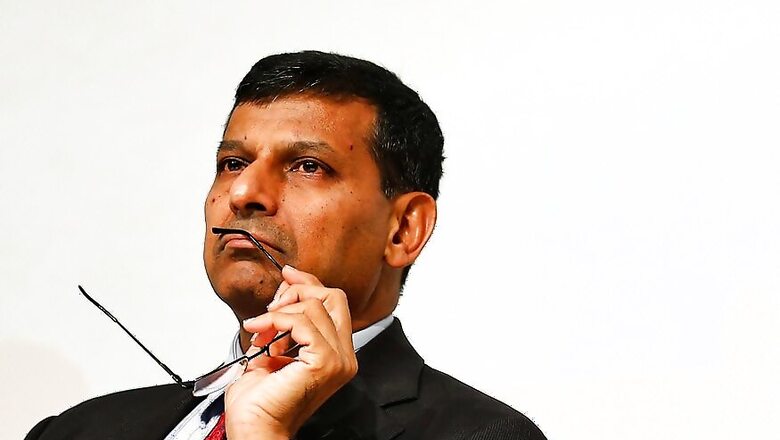
views
New Delhi: When Raghuram Rajan took over as Governor of the Reserve Bank of India in September 2013 the Indian economy was in dire straits. Inflation was running high, the currenct account deficit was at an all time high and the Rupee was falling precipitously in value. The RBI had just blown up a lot of its forex reserves in trying to fix the problem.
It is a measure of Rajan's stabilising hand that he and the RBI slowly got the Indian economy back on track. Dollar inflows increased, stabilizing the rupee and shrinking the current account deficit and, most importantly, inflation was reined in. However, one area that Dr Rajan left incomplete was cleaning up the Indian banking sector.
"In 2013 India was labeled as part of the fragile 5 and I spent a month drawing up plans about how to stabilize the economy," Dr Rajan said in Chennai at the launch of his new book 'I Do What I Do'. "I was advised to concentrate on inflation control, everything else would fall into place."
So successful was Dr. Rajan and his team in reining in price rise that when he exited the RBI three years later, he handed his successor a small memento: A symbol of the Rupee with the words 'Hamari Zimmedari' (our responsibility) inscribed underneath. This was the most important function of the central bank, Dr Rajan was telling Urjit Patel, protect the value of the currency.
Key to those stormy economic weeks and months in late 2013 was an idea that Dr Rajan despised when he was chief economic adviser. With the rupee sinking, the newly minted Goveror put into action a plan he had earlier hated.
Under a scheme called FCNR(B), Indian banks could get American dollars into the country and return it after three years, for a 3.5% profit. Chief Economic Adviser Rajan thought this was another example of greedy bankers profiting at the expense of the country. But Governor Rajan was forced to try it out to stabilise the Rupee.
If the scheme didn't work, the exchequer would lose about Rs 6-10,000 Crore. On the other hand, if this currency hedge mechanism wasn't tried, the country could have lost Rs 80,000 crore.
However, if the scheme went awry, would the CAG produce an adverse audit report that indicted the RBI?
These were the thoughts that Dr Rajan was thinking when he okayed the scheme. As it turns out, it brought in $26 billion in anticipation of a new stable government in the general elections due in 2014, stabilised the rupee, reined in inflation and actually made the RBI a profit. Today, inflation is at its lowest rate in a long time and Dr Rajan has to be given the credit.
However, Dr Rajan, in his opening comments in Chennai said that the biggest challenge today is to clean up the balance sheets of public sector banks of the huge NPAs. "This is the biggest thing holding back the Indian economy," Dr Rajan said.
Dr Rajan said that the Governor is essentially the risk manager of the economy and in that role, "You have to sometimes speak out about the risks of something, you have to say this is a violation of my judgment."
Dr. Rajan's comments were generalized and didn't provide a context for this particular statement. However, a big point of contention between RBI governors and the Finance Ministry has been interest rates, or the repurchase rate that the RBI sets. But, it could also be in the context of Demonetisation, which Dr Rajan has been maintaining he would not have recommended.
Of course, Dr Rajan left the RBI before Demonetization was announced in November 2016. The circumstances of his exit are controversial and mired in uncertainty.
Dr Rajan said that the RBI Governor cannot be treated as "just another technocrat" becasue he controls $350-400 billion of forex reserves, sets the benchmark interest rate of the Indian economy and is the lender of last resort. This means that the risk manager of the Indian economy must sometimes counsel the government in private and other times in public.
"Not going along with the government will not make you too many friends, but just becasue the government wants something doesn't mean you say yes, because it could harm the economy," Dr Rajan said.
The press also came in for light hearted criticism. "The press is always interested in what the Governor has to say, but it is hard to offer a nuanced answer becasue the press invariably says "Governor Slams So & So", communication is a double edged sword," Dr Rajan said.
In fact, Governors tend to avoid saying anything in public, especially about monetary policy, since it is market sensitive news, while reporters who tail the RBI Governor invariably only want to ask questions on interest rates and monetary policy.
Your correspondent was one of those who shadowed the RBI Governor obsessively in a previous avatar. But as the old saying on the RBI beat goes "When the Governor sneezes, the markets catch a cold."
Dr Rajan said it was best for the country to "under promise and overachieve". "The notion that at every corner we have to say we are the best should be avoided," Dr Rajan told the audience.
Any guesses who that comment was aimed at?




















Comments
0 comment